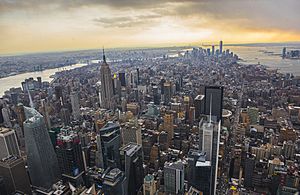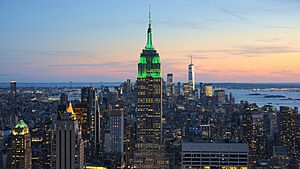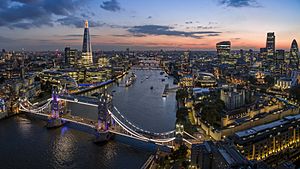Global city facts for kids
A global city is a very important city that plays a big role in the world's economy. You might also hear it called a power city, world city, or alpha city. These cities are like major hubs or connection points in a huge worldwide network.
The idea of a global city comes from people who study geography and cities. They believe that as the world becomes more connected (this is called globalization), some cities become super important. These cities have a lot of influence over things like money, trade, and culture all around the world. A global city is the most complex and important hub in this international system. It has strong links to other cities that directly affect global business and social life.
What makes a city "global" can depend on who you ask. But generally, global cities have a lot of modern buildings, a large population, and many big international companies. They also have a strong financial sector that connects to the rest of the world. Their transportation infrastructure (like airports and ports) is very well-developed and linked internationally. These cities often lead their country's economy and have excellent schools and research institutions. They also create new ideas, inventions, or cultural trends that spread globally. Some of the best examples, according to most studies, are New York City, London, Paris, and Tokyo.
Contents
What is a Global City?
The term 'global city' became popular thanks to a sociologist named Saskia Sassen. She used it in her 1991 book, The Global City: New York, London, Tokyo. Before her, other names were used for cities with similar features.
For example, the term 'world city' was used in 1886 to describe Liverpool, a city heavily involved in global trade. A British sociologist and geographer named Patrick Geddes also used this term in 1915. The word 'megacity' (meaning a very large city) started being used in the early 1900s. Today, when people talk about global cities, they often focus on how strong their financial power is and how much high-tech they have.
What Makes a City Global?

Different groups have different ways to decide which cities are global cities and how to rank them. While most agree on the top global cities, the exact rules can change which other cities are included.
Here are some common things that make a city a global city:
- International Money Hub: They offer many international financial services. This includes banking, insurance, real estate, and accounting. They also have many financial company headquarters and a stock exchange.
- Big Business Headquarters: Many multinational corporations (companies that operate in many countries) have their main offices there.
- Trade and Economy Leaders: They control the trade and economy of a large area around them.
- Major Manufacturing and Shipping: They are big centers for making goods and have important ports for shipping things around the world.
- Global Decision-Making: People in these cities make important decisions every day that affect the whole world.
- New Ideas and Innovations: They are places where new ideas and inventions in business, economics, and culture are born.
- Media and Communication Centers: They are hubs for digital and other forms of media and communication that connect global networks.
- National and International Importance: They are very important to their own country and have a lot of international influence.
- Service and Information Jobs: A high number of people work in the services sector (like healthcare or education) and the information sector (like tech or research).
- Top Schools and Research: They have excellent universities and research facilities that attract students from all over the world.
- Great Infrastructure: They offer some of the best legal, medical, and entertainment services in the country.
- Diverse Culture: They have a wide variety of languages, cultures, religions, and ideas.
Top Global Cities Rankings
Many different groups rank global cities. New York City, London, Tokyo, and Paris are almost always at the top of these lists.
GaWC Study
The Globalization and World Cities Research Network (GaWC) ranks cities based on how connected they are through four "advanced producer services": accounting, advertising, banking/finance, and law. They have different levels of global cities.
In their 2022 list, the top cities are:
Alpha ++ Cities
Alpha + Cities
Alpha Cities
 Amsterdam
Amsterdam Brussels
Brussels Chicago
Chicago Frankfurt
Frankfurt Istanbul
Istanbul Jakarta
Jakarta Kuala Lumpur
Kuala Lumpur Los Angeles
Los Angeles Luxembourg City
Luxembourg City Madrid
Madrid Mexico City
Mexico City Milan
Milan Mumbai
Mumbai São Paulo
São Paulo Seoul
Seoul Sydney
Sydney Toronto
Toronto Warsaw
Warsaw
Global Cities Index (Kearney)
In 2008, the magazine Foreign Policy and the company A.T. Kearney started ranking global cities. They said that "the world's biggest, most connected cities help set global agendas." These cities are like engines that drive growth for their countries and connect different regions.
Their ranking uses 27 different measures in five areas: business activity, human capital (talented people), information exchange, cultural experiences, and political involvement.
The top cities in 2023 are:
Global Cities Index (Oxford Economics)
The company Oxford Economics released its Global Cities Index in 2024. They ranked 1,000 cities based on 27 measures in five areas: economics, human capital, quality of life, environment, and governance. They put more importance on economic factors.
The top cities in 2024 are:
Global Power City Index
The Mori Memorial Foundation in Tokyo created a study of global cities in 2008. They rank cities in six areas: economy, research and development, cultural interaction, livability (how good it is to live there), environment, and accessibility (how easy it is to get around).
The top 10 cities in 2023 are:
Financial Importance
Being a strong financial center is one of the most important signs of a global city.
Global Financial Centres Index
The Global Financial Centres Index ranks the world's top financial centers. As of 2024, the top ten are:
See also
 In Spanish: Ciudad global para niños
In Spanish: Ciudad global para niños
 | Tommie Smith |
 | Simone Manuel |
 | Shani Davis |
 | Simone Biles |
 | Alice Coachman |



